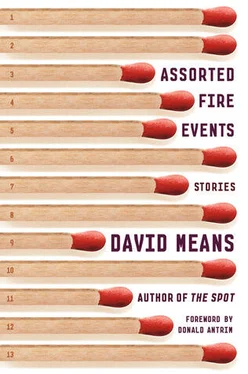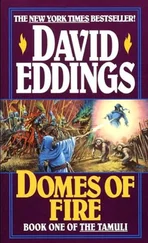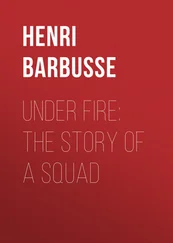David Means - Assorted Fire Events - Stories
Здесь есть возможность читать онлайн «David Means - Assorted Fire Events - Stories» весь текст электронной книги совершенно бесплатно (целиком полную версию без сокращений). В некоторых случаях можно слушать аудио, скачать через торрент в формате fb2 и присутствует краткое содержание. Год выпуска: 2012, Издательство: Faber & Faber, Жанр: Современная проза, на английском языке. Описание произведения, (предисловие) а так же отзывы посетителей доступны на портале библиотеки ЛибКат.
- Название:Assorted Fire Events: Stories
- Автор:
- Издательство:Faber & Faber
- Жанр:
- Год:2012
- ISBN:нет данных
- Рейтинг книги:4 / 5. Голосов: 1
-
Избранное:Добавить в избранное
- Отзывы:
-
Ваша оценка:
- 80
- 1
- 2
- 3
- 4
- 5
Assorted Fire Events: Stories: краткое содержание, описание и аннотация
Предлагаем к чтению аннотацию, описание, краткое содержание или предисловие (зависит от того, что написал сам автор книги «Assorted Fire Events: Stories»). Если вы не нашли необходимую информацию о книге — напишите в комментариях, мы постараемся отыскать её.
won a Los Angeles Times Book Prize, was nominated for a National Book Critics Circle Award, and received tremendous critical praise. Ranging across America, taking in a breathtaking array of voices and experiences, this story collection now stands as one of the finest of our time.
Assorted Fire Events: Stories — читать онлайн бесплатно полную книгу (весь текст) целиком
Ниже представлен текст книги, разбитый по страницам. Система сохранения места последней прочитанной страницы, позволяет с удобством читать онлайн бесплатно книгу «Assorted Fire Events: Stories», без необходимости каждый раз заново искать на чём Вы остановились. Поставьте закладку, и сможете в любой момент перейти на страницу, на которой закончили чтение.
Интервал:
Закладка:
“Go on, Arno, give it a shot,” Snag said. Snag was sixteen or seventeen, with the face of a seventy-five-year-old beach bum. He had long hair that was clumped together with scalp oil, real oil, dirt and old vomit — what was left over from the old dreadlock thing he used to have. His eyes, if looked at long enough, solidified into something along the lines of ice cubes; in them one found the stiff coldness that comes from all the drugs, combined with the beatings his old man had given him. His arms were long and thin and brittle with track marks. If asked, he says he doesn’t use drugs. Never has. And there is something about his story — the wide claims he makes — that rings true with the other guys. He hasn’t used drugs. If anything, the needles have shot him up. The crack had to burn someplace, and it picked his pipe. All the monkeys pounding randomly on typewriters ended up writing his story.
“Why don’t you do it? Snag. Go in the fuckin’ hotel.” Arno barely opened his lips over his damaged teeth. Plumes of ice-smoke illustrated his words. He isn’t a big fan of this kid. Having a kid like this around can get you into trouble. Snag wasn’t from Elma. He had an outsider’s skewed vision — from Dearborn, near Detroit.
“We can get past the high school kid,” Snag persisted. “All you have to do is get Roy over there”—he turned, nodded past the bright yellow-copper lights to a another hunk of decorative bush—“and let him start pissing or something so the guy comes out. He comes out to yell at Roy, we go in. Simple as that.”
There was a long communal silence as the men thought over the situation. Zeek began nodding yes to some unspoken question and kept it up for a long time. Zeek was fifty, soft in the head, with a clot of beard around his mouth that gave him the alternative nickname Lint Trap. (He’d die in a few weeks of a bleeding ulcer — half his blood would end up in his stomach cavity, swishing around while his blood pressure dipped. A ten-year-old boy, delivering his Sunday morning papers, would find him frozen to death.)
No one remembers how long it was before Roy, in a sudden burst of what might be called the inspiration of the last ditch, stood up and stretched his arms over his head. His pants were tattered, moth-holed, picked up at Goodwill years ago. “Ah, shit, I’m gonna do it myself,” he said, and before Arno or anyone else could respond, he was off into that semicircle of brightly lit concrete, moving swiftly, parting the electric doors while the valet bent down to adjust his radio, or tie his combat boots — not that it mattered. The men didn’t show the slightest interest in following their friend into that bright abyss. They sat back down, closing the circle, holding their own in a silent huddle, shaking their heads slightly, while Arno remembered how remarkable the bow in the old fart’s legs had been as he stood under the steaming water in the shower at the First Baptist shelter; they were thin legs that bowed under the weight of a long, hard life.
The din in the room hissed with the dull undercurrents of a second marriage; the dark ceiling hung with long strands of crimped silver foil. Below the silver strands were twenty round tables. At one of them Mr. Standard worked on his third scotch, barely able to hold the plastic cup in his large hands. He wanted to crush the cup, to watch it explode. The reception — after about an hour of bad toasts — had become as flat and dull as a bad ball game; nothing was moving, just a shimmer of heat over a blank field. On the dais along with the rest of the wedding party sat Melville, Mel Horton, the groom, with his frank, round face that seemed — at least to Standard — to need breaking in, like a new baseball glove. Someone should pour neat’s-foot oil onto it and mash a fist around, grind it right in — get that rich freshness, that silver-spoon suck, out of those cheeks, he thought. But then he looked over at his wife, at her narrow cheekbones and the fine shape of her wrists. She certainly wouldn’t approve of such a thought one bit. She was best friends with the bride, Susan Porter, who was up there now, shifting around in her wedding gown with that sad complacency Standard had seen a hundred times in other second-timers. He was a firm believer in the downfall of man. His company, Standard Pipe, was going through harder times, having traveled through hard times. It was rusting out, literally: long bleeding smears of rust drew tongues along the patched corrugated steel sides of the main works. Windows were broken and he was barely able to mill his orders anymore. As he sucked his scotch he kept thinking about Melville Horton’s last visit to the office. The bastard stood there in that fine suit of his with his hands dug deep into his pockets. Standard’s office was a little backroom deal, with yellowed blinds and overstuffed filing cabinets and no pretensions of grandeur. On the wall to the left were his old Rotary Club plaques, a few golf trophies blued by dust. One drawer of the file cabinet was open, off the track, and had been that way for ten years. Strangely, this office didn’t in any way really reveal the true nature of Standard, who, by most measures, was fastidious and careful in both his personal matters and his business matters. His cuticles were groomed, his nails perfectly clipped. The office just didn’t matter to him much, not the way the actual metalworks did. And so when Melville Horton sniffed and ran a thumb over his Rotary Man of the Year 1968 plaque, he felt the kind of deep sense of imbalance that just about sent him into a sputtering rage; if there was anything he hated more in the world, it was being snubbed by a kid who wasn’t even a sperm cell when he was wading ashore at Normandy.
“I can’t do this kind of business,” Horton was saying, moving back from the plaque, looking for a chair, finding an old one with a green seat, cross-hatched with gray duct tape. He remained standing. “How am I supposed to get my orders filled when this stuff you’re supposed to do isn’t there in time? I’ve got a machinist rigging a whole new getup, and Bob is working overtime to get the old one running, and then I’m told by Standard that there isn’t pipe coming — so all that work’s for naught.”
Standard looked him up and down before he spoke. Horton was young enough to be his son, the one killed near Khe Sanh, Hill 861, as a member of the 1/9. But unlike his son, who had been rough, a prime all-state quarterback in high school, this kid had a yuppie gloss. His suit was cut a bit too big, hanging over his fat stomach, loose and bagging on the shoulders. “The order’s coming,” Standard mumbled, “I said it would, and it will. We’re just overbooked. I mean Tilco went nuts. Sent us double widths accidently. Then this train strike, I mean to get a box order from Dayton took me a month; and then the fucking thing derailed.”
This kid Melville Horton didn’t understand the old-fashioned unspoken agreement that you didn’t march into a man’s office during a train strike demanding a late job if it wasn’t a matter of real cash. He was an idiot. And Melville wasn’t short on money, not with his shop taking a hundred orders a week. On top of that he was operating the whole thing as a kind of hobby anyhow, because his old man’s old man had founded Cap Soaps before it was incorporated. The bastard cashed in when it went public. He had plenty of liquid assets to move around when needed. The kid didn’t have to worry about derailments or bad tooling. The jerkoff could buy the frickin’ railroad if he felt like it.
The DJ was playing mambo music. There was a muffled announcement, another last-ditch toast to pump life into the reception. Standard put the plastic cup to his lip and sucked the last drops out of the ice.
Читать дальшеИнтервал:
Закладка:
Похожие книги на «Assorted Fire Events: Stories»
Представляем Вашему вниманию похожие книги на «Assorted Fire Events: Stories» списком для выбора. Мы отобрали схожую по названию и смыслу литературу в надежде предоставить читателям больше вариантов отыскать новые, интересные, ещё непрочитанные произведения.
Обсуждение, отзывы о книге «Assorted Fire Events: Stories» и просто собственные мнения читателей. Оставьте ваши комментарии, напишите, что Вы думаете о произведении, его смысле или главных героях. Укажите что конкретно понравилось, а что нет, и почему Вы так считаете.












